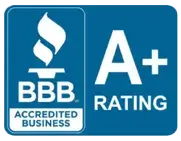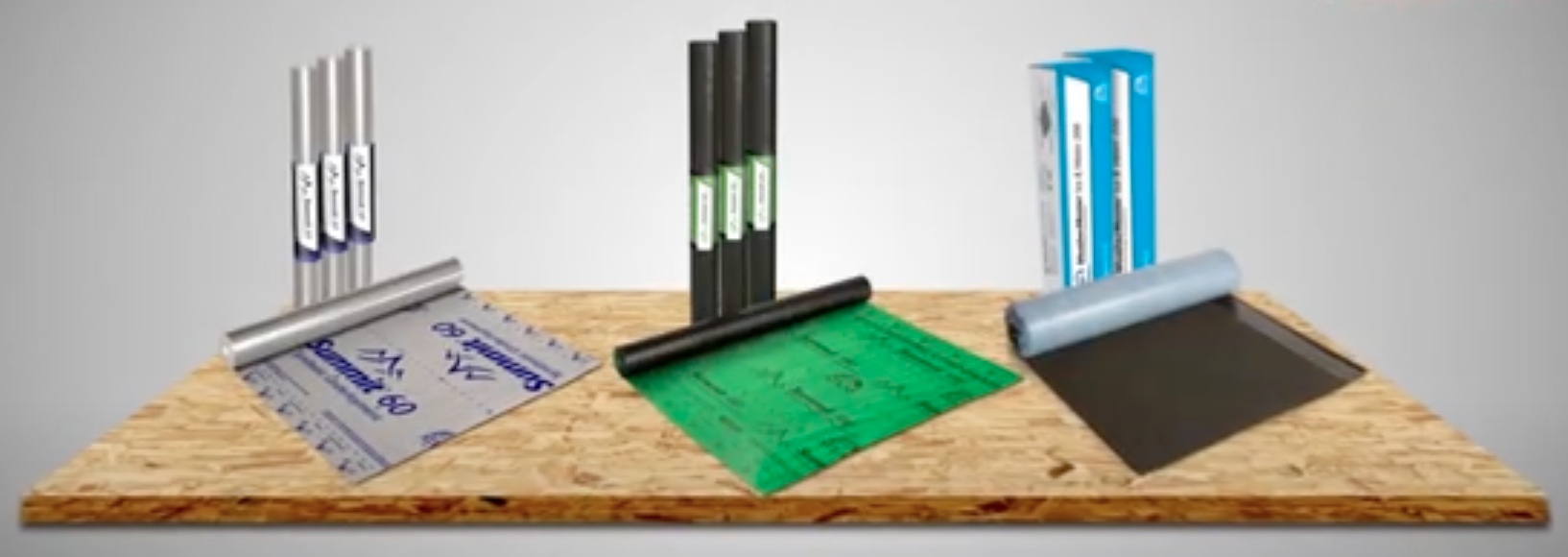What is the best underlayment for roofing?
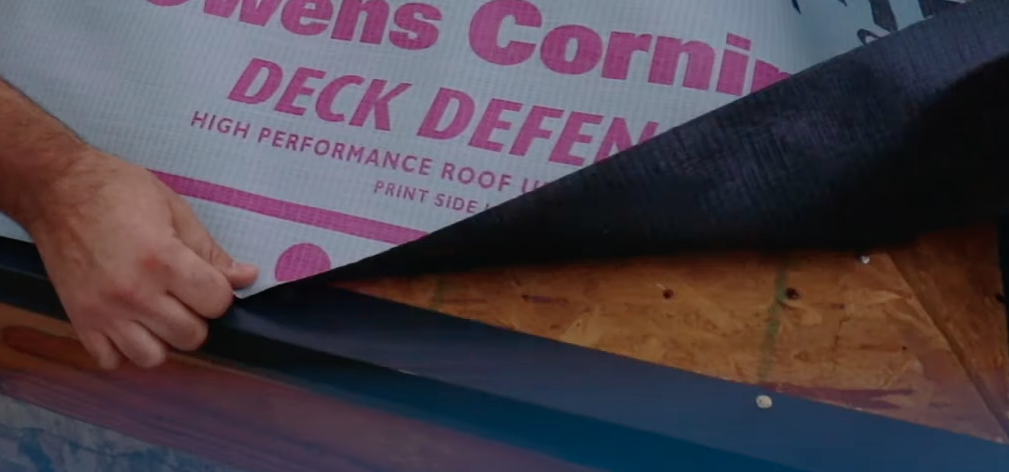
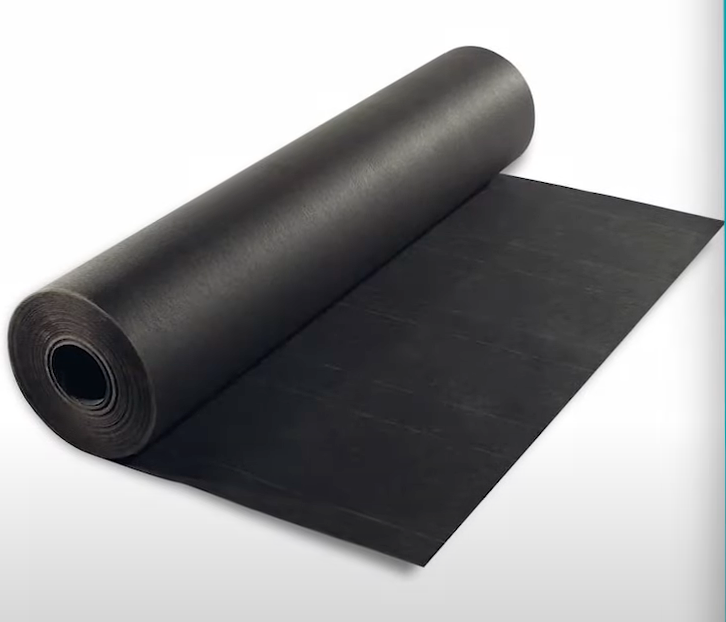
Hart Roofing & Construction
What Is Roofing Underlayment?
Roofing underlayment is a protective layer of material installed between the roof deck (the structural surface) and the outer roofing material (such as shingles, tiles, or metal panels). It serves as an essential component of a roofing system, providing several critical functions that contribute to the overall performance and longevity of the roof.
Hart Roofing & Construction
The importance of roofing underlayment lies in the following key reasons:
Roofing underlayment acts as a waterproof barrier, preventing water from infiltrating the roof deck and causing damage to the underlying structure. It safeguards the roof from leaks caused by rain, snow, or ice dams, ensuring that water does not seep into the building’s interior.
In the event of damage to the primary roofing material due to extreme weather or other factors, the underlayment acts as a secondary layer of defense. It provides temporary protection until repairs or replacement of the outer roofing material can be carried out.
Underlayment helps manage moisture that may accumulate on the roof deck due to condensation. By creating a moisture-resistant barrier, it prevents mold growth, wood rot, and other issues caused by excess moisture.
Some types of underlayment offer additional insulation properties, helping to regulate temperature fluctuations. This can improve energy efficiency by reducing heat transfer between the roof and the building’s interior.
The choice of underlayment should consider the local climate and weather patterns. Some underlayments are better suited for extreme temperatures, while others are designed to resist UV damage.
Underlayment provides a smooth and even surface for the installation of the outer roofing materials. It helps reduce the risk of wrinkles, bumps, or irregularities during the roofing installation process, ensuring a neat and aesthetically pleasing appearance.
Roofing underlayment acts as a protective layer during the roofing installation process. It shields the roof deck from potential damage caused by foot traffic and the installation of roofing materials.
By providing an additional layer of protection, roof underlayment can extend the life of the overall roofing system. It helps preserve the integrity of the roof deck and minimizes the risk of premature roof failure.
Many building codes and local regulations require the use of roofing underlayment as a standard practice. Installing underlayment ensures compliance with these codes and ensures a safe and properly constructed roof.
Proper installation of underlayment is crucial for its effectiveness. It should be installed by experienced roofing contractors who follow the manufacturer’s guidelines.
Roofing underlayment is a crucial element of any roofing system, as it provides essential protection against water infiltration, acts as a secondary layer of defense, and contributes to the overall longevity and performance of the roof. Properly installed underlayment is vital for maintaining a dry, secure, and well-protected building.
Hart Roofing & Construction
Best Roofing Underlayment
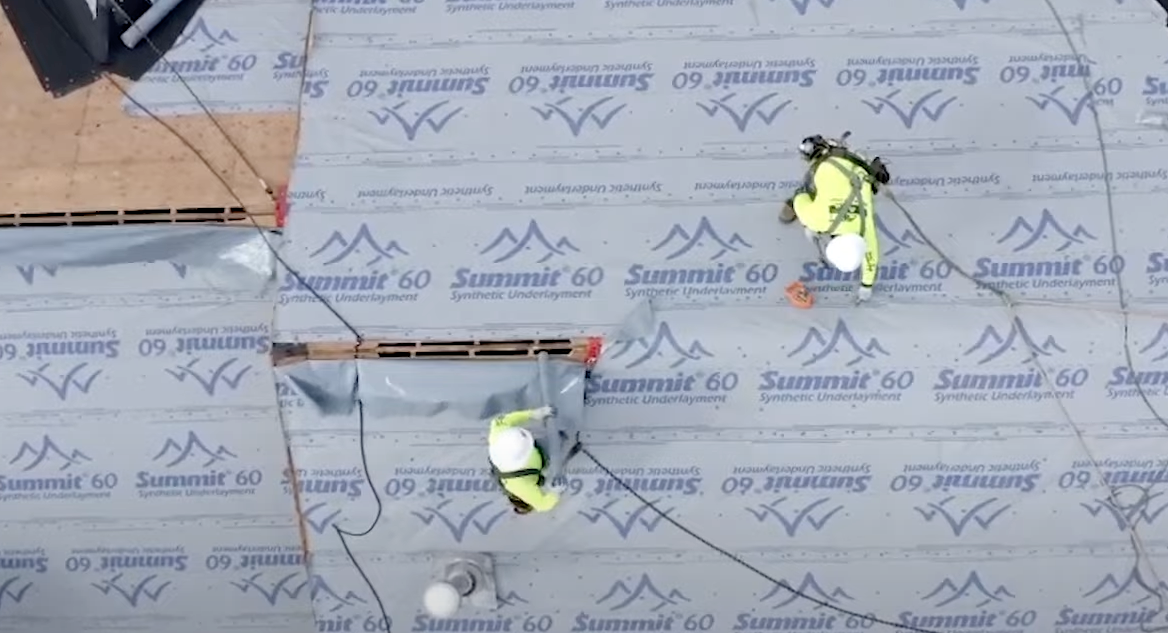
When it comes to roofing underlayment, there are several options available, and the best choice depends on the specific needs of your roofing project. Here are some common types of roofing underlayment and their advantages:
This traditional roofing felt is one of the most common types of underlayment. It is typically made from organic or fiberglass material saturated with asphalt. ASF is cost-effective and provides a basic level of protection against water infiltration. However, it may not be as durable or resistant to tearing as some other options.
Synthetic underlayments are made from advanced polymers and offer superior performance compared to traditional felt. They are lightweight, durable, and have a higher resistance to tearing and water penetration. Synthetic underlayments often have unique features like slip resistance, which can be helpful during installation.
This type of underlayment contains asphalt and rubber modifiers, providing excellent waterproofing properties. Rubberized asphalt underlayments are self-sealing, meaning they can create a watertight barrier around nails and fasteners, reducing the risk of leaks.
Suitable for metal roofing installations, high-temperature underlayments are designed to withstand the extreme temperatures that metal roofs can generate. They prevent the transfer of heat and protect the top from potential damage.
Also known as self-adhering underlayment, this type eliminates the need for fasteners as it adheres directly to the roof deck. It provides a secure and watertight seal, making it a good choice for areas prone to high winds and heavy rain.
This type of underlayment is made from materials like polyethylene and polypropylene. It offers good tear resistance, and water protection, and can be used for various roofing materials.
The “best” underlayment for roofing depends on factors such as the roofing material used, the climate in your area, budget considerations, and local building codes. For example, if you’re installing a metal roof, a high-temperature underlayment or synthetic underlayment with good water resistance might be a preferred choice.
It is recommended to consult with a roofing professional or contractor to determine the most suitable underlayment for your specific roofing project, as they can assess the unique factors related to your roof and provide personalized recommendations.
Hart Roofing & Construction
Best Synthetic Roofing Underlayment
There are several excellent synthetic roofing underlayment options available on the market. It’s essential to consider factors such as your specific roofing needs, climate conditions, and budget when selecting the best one. While I can’t provide real-time data, I can mention some well-regarded synthetic roofing underlayments that were highly regarded at the time:
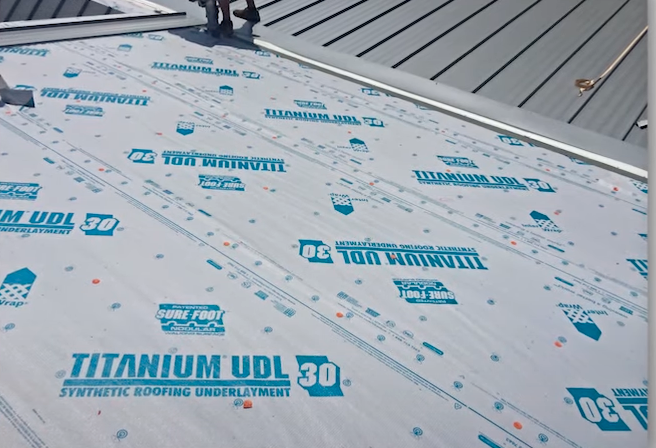
GAF is a reputable roofing material manufacturer, and their Deck-Armor synthetic underlayment is known for its durability, tear resistance, and slip resistance. It is suitable for various roofing applications and provides excellent protection against water infiltration.
Owens Corning is another trusted name in the roofing industry, and their ProArmor synthetic underlayment is designed to be tough and dependable. It offers superior water resistance and UV protection.
CertainTeed’s DiamondDeck synthetic underlayment is known for its high-performance characteristics. It provides good traction during installation and has a durable construction to withstand harsh weather conditions.
The Titanium UDL synthetic underlayment by InterWrap is designed with advanced polymer technology, making it lightweight and easy to handle. It offers excellent waterproofing and is suitable for various roofing materials.
The Sharkskin Ultra Radiant synthetic underlayment by InterWrap is known for its radiant barrier properties, reflecting heat away from the roof. This can help improve energy efficiency and reduce cooling costs.
To determine the best synthetic roofing underlayment for your specific needs, it is recommended to consult with roofing professionals or manufacturers directly. They can provide tailored recommendations based on the latest products available in the market and your unique roofing requirements.
Hart Roofing & Construction
Best Roofing Underlayment for Metal Roof
The best metal roofing underlayment is a high-quality synthetic underlayment designed specifically for metal roofs. It offers superior waterproofing, durability, and tear resistance, protecting the roof deck from water infiltration and potential damage.
This lightweight underlayment is easy to handle during installation and provides a reliable barrier against wind-driven rain and other harsh weather conditions.
With its excellent performance in extreme temperatures, it ensures the longevity and effectiveness of the metal roofing system, making it a top choice for enhancing the overall protection and performance of metal roofs.
Hart Roofing & Construction
Best Roofing Underlayment for Asphalt Shingle Roof
When considering the best roofing underlayment for your asphalt shingle roof, you have several options to choose from, including synthetic roof underlayment and rubberized roof underlayment. These types of underlayment are becoming increasingly popular due to their superior performance compared to traditional materials.
A roofing system with asphalt shingles requires a reliable and best roof underlayment installed before the shingles can be laid. The underlayment acts as a crucial barrier, protecting the roofing deck from water infiltration and other potential damage. Both the synthetic and rubberized underlayment offers excellent waterproofing properties, ensuring a secure and durable roof.
Before you install roof underlayment, it’s essential to consider the specific features and benefits of each type. For instance, synthetic underlayment is lightweight, tear-resistant, and easy to work with, making it a favorite among roofing professionals. On the other hand, rubberized underlayment provides self-sealing properties, creating a watertight barrier around nails and fasteners.
To achieve the best results and prolong the life of your asphalt shingle roof, make sure to choose the best roofing underlayment that suits your climate and local building codes. Consult with a roofing expert to get personalized recommendations based on your roofing needs and preferences. Once the right underlayment is selected, proceed with the installation process, following the manufacturer’s guidelines for the best possible outcome.
Hart Roofing & Construction
Residential vs Commercial Roof Underlayment
Residential Roof Underlayment:
- Materials: Residential underlayment options include asphalt-saturated felt (ASF) and synthetic underlayments. ASF is a more traditional option, while synthetic underlayments are becoming increasingly popular due to their superior performance and durability.
- Waterproofing: Residential underlayments focus on effective waterproofing to protect the home’s interior from potential leaks and moisture damage.
- Installation Ease: Residential underlayments are typically lightweight and easy to handle, which is advantageous for residential roofing contractors during installation.
- Aesthetics: As residential roofs are more visible from the ground, some synthetic underlayments come with printed guidelines to assist with proper shingle placement, enhancing the overall appearance of the roof.
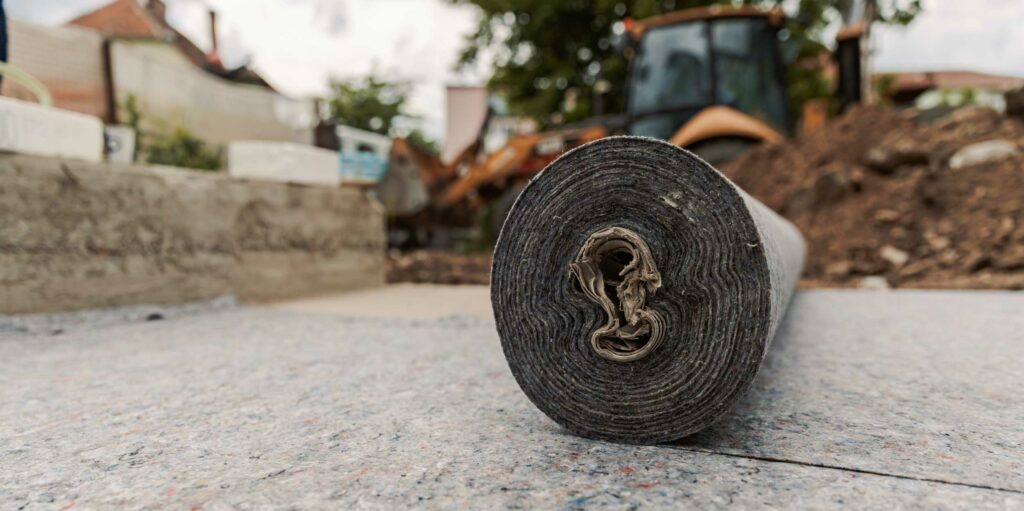
Commercial Roof Underlayment:
- Materials: Commercial underlayments are often heavier and more robust, such as rubberized asphalt underlayments, due to the larger scale and higher demands of commercial roofing projects.
- Waterproofing and Protection: Commercial underlayments prioritize enhanced waterproofing and protection, as commercial buildings usually house valuable assets or sensitive equipment that require extra safeguarding.
- Roof Design and Pitch: Commercial roofs often have flatter slopes or unique designs, requiring specialized underlayment solutions to accommodate different roof configurations.
- Durability: Commercial underlayments are engineered to withstand prolonged exposure to harsh weather conditions and to endure the demands of commercial use.
Hart Roofing & Construction
Superior Roof Underlayment Services from
Hart Roofing & Construction
At Hart Roofing & Construction, we pride ourselves on being the leading choice for roof underlayment services, backed by our strong affiliation with the Roofing Contractors Association of Texas. Our commitment to excellence and adherence to industry best practices set us apart as a trusted partner for all your roofing needs. When it comes to selecting the right roof underlayment, our experienced team of professionals will guide you through the process, taking into account your specific roofing material, local climate conditions, and budget constraints. By choosing us, you’re not only benefiting from our expertise and top-quality materials, but you’re also ensuring that your roofing project aligns with the highest standards of the roofing industry.
At Hart Roofing & Construction, we stand behind our work, guaranteeing a secure foundation for your roof, providing you with peace of mind and a lasting investment. Experience the difference with our superior roof underlayment services, trusted by the Roofing Contractors Association of Texas and valued by our satisfied customers.
